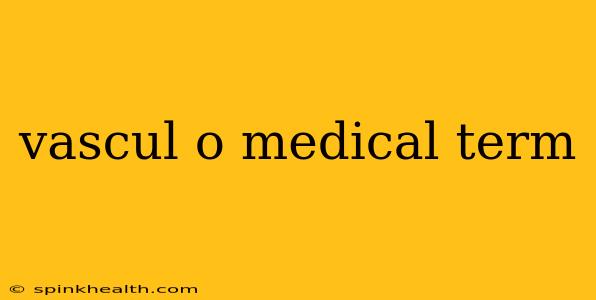The word "vascul" might seem like a cryptic medical term, popping up in medical reports and leaving you scratching your head. But fear not! This seemingly obscure word holds a key to understanding a crucial part of our bodies: the vascular system. Let's embark on a journey to decipher its meaning and explore its significance in the world of medicine.
Imagine a vast, intricate network of roads and highways crisscrossing your body, tirelessly transporting vital supplies to every corner. That's essentially what the vascular system is – a complex network of blood vessels responsible for the circulation of blood. And "vascul," you guessed it, is a root word directly related to vessels. It's a shortened version of "vascular," which itself comes from the Latin word "vasculum," meaning "small vessel."
So, whenever you see "vascul" in a medical context, it's a clear indicator that the discussion is focused on blood vessels. This could encompass arteries, veins, or capillaries – all vital components of this intricate delivery system.
What Does "Vascul" Specifically Refer To?
The term "vascul" doesn't stand alone as a complete medical term. Instead, it serves as a component within larger terms, helping to define a specific aspect related to blood vessels. For example, you might encounter terms like:
- Vasculitis: This refers to the inflammation of blood vessels. Understanding the root "vascul" immediately gives you a clue about the affected area.
- Vascular Dementia: Here, "vascul" highlights the involvement of blood vessels in the cause of cognitive decline. The condition is characterized by impaired blood flow to the brain, impacting its function.
- Vascular Surgery: This specialty focuses on surgical procedures involving blood vessels, addressing issues such as blockages or aneurysms.
Understanding the Importance of the Vascular System
The vascular system's role in maintaining our health is paramount. It ensures:
- Oxygen Delivery: Blood carries oxygen from the lungs to every cell in the body, fueling essential bodily functions.
- Nutrient Transportation: Nutrients absorbed from food are delivered throughout the body via the bloodstream.
- Waste Removal: The vascular system effectively removes waste products like carbon dioxide, ensuring healthy cellular function.
- Immune Response: White blood cells, crucial components of the immune system, travel through blood vessels to combat infections.
Frequently Asked Questions about Vascular Terms
Here are some common questions related to vascular terms and their meanings:
What is the difference between arteries and veins?
Arteries carry oxygenated blood away from the heart to the rest of the body, while veins return deoxygenated blood back to the heart. Arteries generally have thicker walls than veins to withstand the higher pressure of blood pumped from the heart.
What are capillaries?
Capillaries are the tiny, thin-walled blood vessels that connect arteries and veins. They are where the exchange of oxygen, nutrients, and waste products occurs between the blood and body tissues.
What are some common vascular diseases?
Common vascular diseases include atherosclerosis (hardening of the arteries), deep vein thrombosis (blood clots in the legs), and aneurysms (bulges in blood vessels).
How is the vascular system examined?
Doctors use various methods to examine the vascular system, including physical exams, ultrasound, angiograms (X-rays with contrast dye), and CT scans.
Understanding the root word "vascul" provides a valuable foundation for comprehending numerous medical terms related to the blood vessels and their significance in maintaining good health. Remember, while "vascul" itself isn't a complete medical term, it acts as a vital clue, pointing toward the circulatory system and its crucial role in our overall well-being.

